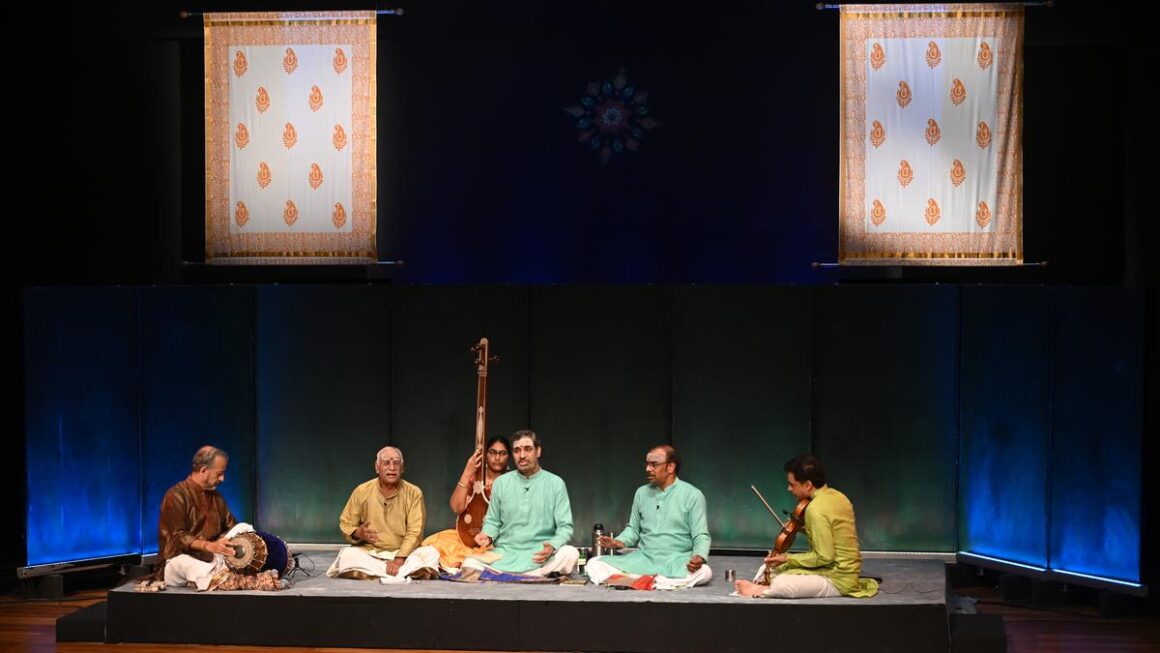
Malladi Suribabu with sons Malladi Sreeram Prasad and Malladi Ravikumar performing at Asian College of Journalism’s M.S. Subbulakshmi auditorium
| Photo Credit: M. Srinath
From the opening with ‘Shanka chakra gadha pani’ in Poornachandrika to concluding with a ragamalika ‘Udayadri pai,’ the Malladi Trio’s performance at MadRasana’s unamplified concert series had a divine resonance. The singing of Malladi Suribabu along with his sons Malladi Sreeram Prasad and Malladi Ravikumar was a testament to the enduring vitality of Carnatic music. With the extremely talented Embar Kannan (violin) and K.V. Prasad (mridangam) for accompanists, the evening turned into a celebration of fine artistry.
The concert commenced with Muthuswami Dikshitar’s kshetra kriti, ‘Shanka chakra gadha pani’, an ode to Venkateshwara of Tirumala. The nuances of Poornachandrika were rendered with such precision that it invoked the spirit of the sahitya.
Known for its teevra bhakti bhava, all aspects of Kamavardhini (Pantuvarali) were explored through an alapana by Suribabu with Embar Kannan’s violin mirroring this introspection. Leading to Tyagaraja’s ‘Sundara thara deham ramam,’ the trio’s camaraderie was palpable, creating an atmosphere that felt as intimate as a home jam session.
Tyagaraja’s ‘Nama kusuma mula”’ in Sri Ragam (rettakalai Adi tala) followed, featuring simple yet effective mridangam sol kattu that elegantly underscored the kriti’s mood. At nearly 80, Malladi Suribabu’s voice defied age with its robustness, perfect sruti, and unwavering clarity, leaving the audience awestruck.
Then came an interesting kriti in raga paras/paraju, ‘Adheyanamma harudu’, composed and popularised by Puliyur Duraiswami Iyer. Starting the composition with a brief lyrical prelude, Sreeram Prasad shared that this fast-paced piece describes Parvati’s imaginary vision of Shiva’s cosmic dance (Tandavam). The trio’s manodharma sparkled as each member’s improvisation matched with the others’ energy, evoking a competitive yet harmonious spirit.
The trio’s infectious smiles and energy created an engaging experience for the rasikas.
| Photo Credit:
SRINATH M
The highlight of the evening was undoubtedly the main piece in Mohanam. The alapana showcased the trio’s individual brilliance, beginning with Sreeram Prasad, followed by Ravikumar, and culminating in Suribabu’s rendition, marked by impeccable breath control, followed by Embar Kannan’s intense bowing bringing out the entire raga’s feel of happiness and contentment. Tyagaraja’s ‘Maati maati ke delpa valena muni manasarcita charana’ (‘Oh Rama, should I tell you again and again whose feet is worshipped by the sages) was performed with an engaging explanation of the lyrics’ depth, connecting the audience to the composer’s devotion. The niraval at ‘Shankarapriya sarva’ and the kalpanaswaras paved the way for a spirited tani avarthanam by K.V. Prasad.
Throughout the evening, the trio’s infectious smiles and energy created an engaging experience for the rasikas. Apart from being a musical feast, the concert was also an educational and emotional journey.
The blend of bhakti and karuna rasas articulated in nithya pooja of Annamacharya, set to tune in Dwijavanthi by Suribabu, reflected his deep understanding of the raga’s aesthetics. The trio’s lec-dem segment during the presentation offered rare insights into Dwijavanthi. The references to Mehdi Hassan’s ghazals added a unique cross-cultural dimension. Suribabu’s rendition of a Mehdi Hassan-inspired Dwijavanthi was both innovative and deeply moving, revealing the universality of musical expression. It elicited thunderous applause from the rasikas.
As the concert neared its conclusion, the Kshetrayya padam in Surutti (‘Indendu varchi timira’) was rendered with lyrical finesse. The concluding piece ‘Udayadri pai’, a Lalitha sangeetham tuned in ragamalaika by Suribabu and sung by him, was an emotionally intense presentation.
Each piece in the concert was not merely performed but crafted into an immersive journey.
Published – January 05, 2025 01:05 am IST


Leave a Reply